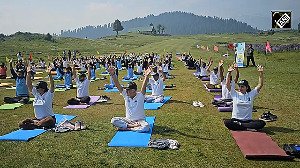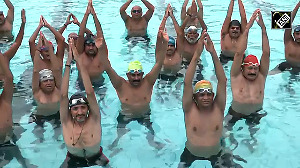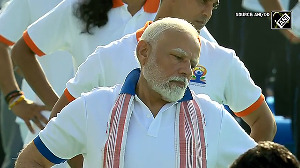Seven months after the 26/11 trial began in a special court in Mumbai, the prosecution on Wednesday concluded its case with examination of 610 witnesses even as lone surviving Pakistani gunman Ajmal Kasab contradicted his lawyer saying he was fit to give his version on evidence adduced against him.
The prosecution wound up its case against Kasab and two Indian accused -- Faheem Ansari and Sabauddin Ahmed -- and said it would seek a letter of rogatory from this court to US court to collect evidence about Lashkar-e-Taiba suspects David Headley and Tahawwur Rana for their involvement in 26/11 attacks.
"We are closing our case today and may seek letter of rogatory to collect evidence against Headley and Rana," Special Public Prosecutor Ujjwal Nikam said while clarifying in the court that LeT had adopted different modules to collect information about targets to launch 26/11 attacks in Mumbai.
One module was given charge of drawing maps of targets while the other was given task of filming places. It appeared from the chargesheet filed by Federal Bureau of Investigation in a US court that Headley and Rana were in the second module while Faheem and Sabauddin Ahmed had drawn maps, Nikam said.
Outside the court, Nikam clarified that arrest of Rana and Headley would not affect the 26/11 trial. If they are extradited it would take some time to bring them to India and would be tried separately, Nikam told PTI.
Judge M L Tahaliyani will record Kasab's statement on December 18 under Section 313 of CrPC on the evidence adduced by prosecution.
Kasab's lawyer K P Pawar created a flutter saying his client was not fit to give a statement on evidence adduced by prosecution, prompting the judge to personally ask the accused about his health condition.
To a query by Judge M L Tahaliyani, Kasab replied: "I am better... have not vomited... have no fever... I am prepared to give a statement to the court on the evidence against me".
The prosecution's aim was to not only prove the case against Kasab, but also expose the prime conspirators from Pakistan-based terror outfit Lashkar-e-Tayiba, Nikam said.
"Kasab is one of the instruments of the terror outfit. He and the nine other slain terrorists were a small part of LeT, which wanted to inflict serious damage to India by attacking its commercial capital," Nikam told PTI.
The prosecution has tabled concrete evidence of Pakistan's links to the attacks in the form of telephone intercepts between the terrorists and their Pakistani handlers, he said.
The court had in the beginning of the trial issued non-bailable warrants against 27 absconding accused, including LeT founder Hafeez Sayeed and the outfit's chief of operations, Zaki-ur-Rehman Lakhvi.
The warrants have been forwarded to the Interpol for execution but so far no one has been arrested.
The prosecution's evidence includes Kasab's statement before a magistrate, in which the gunman has revealed that he and his associates were trained at a LeT camp in Pakistan.
Of the 610 witnesses, the prosecution examined 270 personally, which included senior police officials, forensic experts, eyewitnesses and FBI officials.
The evidences of the remaining formal witnesses have been adduced in the form of affidavits before the court. These witnesses were not examined personally as they were formal in nature and included those who had carried bodies of victims to hospitals, relatives of victims who claimed the bodies, people who suffered damage to their properties and medical officers who treated the victims.
Thirty witnesses identified Kasab in identification parade and in the court.
Forensic experts have also given their opinion that the DNA samples collected from the boat Kuber (in which terrorists landed in Mumbai), matched with the DNA of Kasab and other slain terrorists.
The prosecution has screened in the court CCTV footages of terrorists from cameras installed at Chhatrapati Shivaji Terminus (CST), Times of India Building (opposite CST), Hotel Taj and Hotel Oberoi-Trident. Besides CCTV footages, weapons and RDX seized from Kasab and the slain terrorists have been placed as evidence.
The prosecution is banking on a plea made by Kasab in the court mid-way the trial partly accepting his guilt in the crime.
Kasab had admitted in the court to being part of the conspiracy, but said he played a secondary role in the terror attacks as Abu Ismael was his leader.
The gunman has denied he had fatally shot police officers Hemant Karkare, Vijay Salaskar, Ashok Kamate and Constable Tukaram Omble.
The prosecution is relying upon evidence tendered by foreign experts, who said mobile phones, used by terrorists while talking to their Pakistani handlers during the assault, were imported by a Pakistan firm from China to back its case that the plot was hatched in the neighbouring country.
FBI sleuths have also deposed and told the court that GPS recovered from the accused indicated that the conspiracy was hatched in Pakistan.
In its evidence against Indian accused, Ansari and Sabauddin, the prosecution is relying on a witness who identified both, saying he had seen maps of target locations in their hands before the attacks during his tour to Nepal.
The prosecution has adduced evidence to show that Ansari had procured a Pakistani passport on strength of bogus documents.
The handwriting in the maps seized from slain terrorist Abu Ismael had matched with maps recovered from Ansari after his arrest in Lucknow.
The accused are facing charges under IPC, Unlawful Activities (Prevention) Act, Foreigners Act, Passport (Entry into India) Act, Arms Act, Explosive Substances Act, Damage to Public Properties Act, Indian Railway Act and Customs Act.
A total of 166 persons, including nationals from UK, USA and Israel, were killed and 304 others injured when terrorists struck at Hotel Taj, Hotel Oberoi-Trident, Nariman House, CST, Cama Hospital and Cafe Leopold. The terrorists also blew up two taxis.





